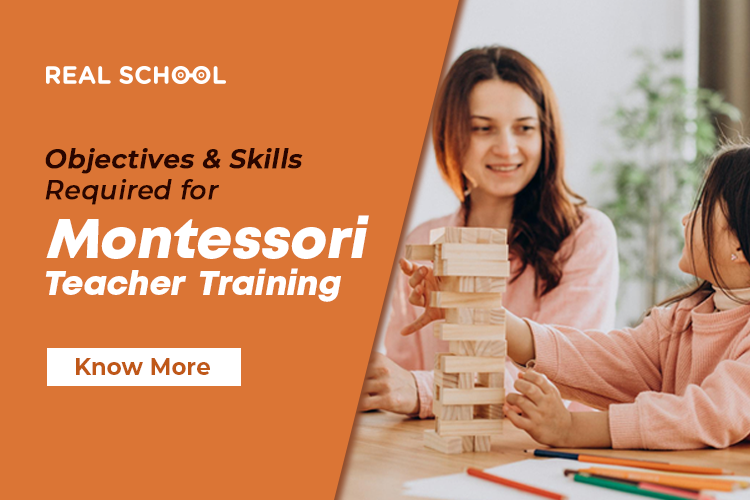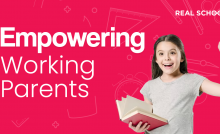Objectives and skills required for Montessori teacher training


Objectives and skills required for Montessori teacher training
Montessori education is a unique and effective approach to teaching that has been around for over a century. As this method’s popularity grows, so does the demand for Montessori teachers. To become a successful Montessori teacher, one must have a combination of skills and knowledge that are specific to this approach to education.
This blog will explore the objectives and skills required for Montessori teacher training and professional development. Whether you are a seasoned educator looking to expand your skills or a new teacher just starting out, this article will provide valuable insights into what it takes to excel in Montessori education.
Understanding Montessori Teacher Training
Montessori teacher training is a specialized program designed to equip individuals with the skills and knowledge needed to become effective Montessori educators. The training program is based on the philosophy and teaching methods of Dr. Maria Montessori, an Italian physician and educator who developed the Montessori approach to education in the early 1900s.
Montessori teacher training programs typically include coursework in child development, Montessori theory and philosophy, curriculum planning and implementation, classroom management, and assessment and evaluation. These programs are available at various levels, ranging from early childhood to elementary education, and may be offered in a variety of formats, including online, on-campus, and hybrid.
The objectives of Montessori teacher training programs are to help educators develop a deep understanding of the Montessori philosophy, principles, and teaching methods, and to learn how to effectively apply these in the classroom. This includes understanding how to create a prepared environment that is conducive to learning, developing strategies for promoting student engagement and self-directed learning, and fostering social and emotional development in students.
In addition to these objectives, Montessori teacher training programs also focus on professional development, providing educators with opportunities to continue their learning and growth throughout their careers. This may include ongoing training in new teaching methods and techniques, attending conferences and workshops, and collaborating with other educators to share best practices.
Overall, Montessori teacher training is essential for educators who are interested in adopting the Montessori approach to education. By completing a training program, educators can develop the skills and knowledge needed to create a dynamic and effective learning environment that supports the growth and development of their students.
Montessori Teacher Training and Professional Development
Montessori teacher training and professional development are important for educators who are committed to implementing the Montessori approach to education. These programs provide teachers with the skills and knowledge they need to create effective learning environments that support the growth and development of their students.
Montessori teacher training programs typically include coursework in child development, Montessori theory and philosophy, curriculum planning and implementation, classroom management, and assessment and evaluation. These programs are designed to provide educators with a deep understanding of the Montessori approach to education and how to effectively apply these principles in the classroom.
Professional development is an important component of Montessori teacher training. It allows educators to stay up-to-date with the latest research and best practices in the field of Montessori education, and provides opportunities to collaborate with other educators and share ideas and strategies. Professional development may include attending conferences and workshops, participating in online courses, and engaging in ongoing training and mentorship programs.
In addition to traditional Montessori teacher training and professional development opportunities, there are also a growing number of Montessori schools and organizations that offer specialized training programs and certifications. These programs can help educators develop specialized skills in areas such as Montessori music education, Montessori art education, and Montessori special education.
Overall, Montessori teacher training and professional development are critical components of a successful career in Montessori education. These programs provide educators with the skills, knowledge, and support they need to create effective learning environments that support the growth and development of their students.
Objectives and Skills Required for Montessori Teacher Training
The objectives and skills required for Montessori teacher training are designed to prepare educators to effectively apply the Montessori approach to education in the classroom. The following are some of the key objectives and skills required for Montessori teacher training:
- Understanding of Montessori philosophy: Montessori teacher training programs emphasize the importance of understanding the philosophy and principles of the Montessori approach to education. This includes an understanding of the role of the teacher as a facilitator, the importance of creating a prepared environment, and the focus on child-centered learning.
- Knowledge of child development: Montessori teacher training programs provide educators with a deep understanding of child development, including the physical, social, emotional, and cognitive development of children at different stages of development. This knowledge is essential for creating a learning environment that supports the growth and development of each child.
- Curriculum planning and implementation: Montessori teacher training programs teach educators how to develop and implement a curriculum that is consistent with the Montessori approach to education. This includes understanding how to create learning activities that are developmentally appropriate, engaging, and aligned with the needs and interests of each child.
- Classroom management: Montessori teacher training programs emphasize the importance of creating a peaceful and orderly learning environment. This includes understanding how to manage behavior and encourage positive social interactions among students.
- Assessment and evaluation: Montessori teacher training programs teach educators how to assess and evaluate student progress using a variety of tools and techniques. This includes understanding how to observe and document student learning, and how to use this information to guide instruction and support student growth and development.
- Effective communication and collaboration: Montessori teacher training programs emphasize the importance of effective communication and collaboration with parents, colleagues, and other stakeholders. This includes understanding how to build positive relationships with parents and how to work effectively as part of a team.
Overall, the objectives and skills required for Montessori teacher training are designed to prepare educators to effectively apply the Montessori approach to education in the classroom. By developing a deep understanding of Montessori philosophy, child development, curriculum planning and implementation, classroom management, assessment and evaluation, and effective communication and collaboration, educators can create effective learning environments that support the growth and development of their students.
Conclusion
In conclusion, Montessori teacher training and professional development are essential for educators who want to implement the Montessori approach to education effectively. The objectives and skills required for Montessori teacher training include a deep understanding of Montessori philosophy, knowledge of child development, curriculum planning and implementation, classroom management, assessment and evaluation, and effective communication and collaboration. By developing these skills, educators can create effective learning environments that support the growth and development of their students, and make a positive impact on their lives.
Recent Posts
What are the Advantages of Online Teaching at The Real School?
In the article -"What are the Advantages of Online Teaching at The Real School?" we…
What is the Full Form of School?: Unveiling the Acronym
The term "school" carries profound significance in the realm of education, representing more than just…
What is Math Full Form?: Cracking the Code
Mathematics, often referred to as "Math," is a subject that elicits various reactions from students…
What is Full Form of Homework?: Decoding Academics
Homework, an integral part of the academic journey, often raises questions about its purpose and…
What is Full Form of Teacher?: Demystifying Education
In the intricate tapestry of education, teachers stand as the pillars shaping the intellectual and…
What is Real Education?: Discovering Its Essence and Impact
The concept of real education is evolving, transcending traditional views that equate it solely with…


